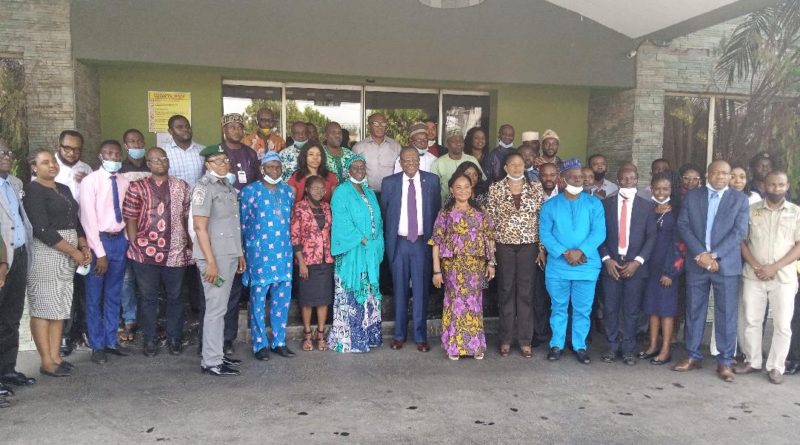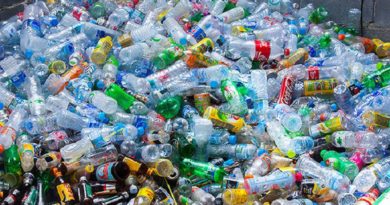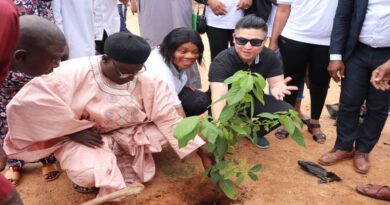Nigeria begins implementation of GEF SAICM project on elimination of lead in paint
Picture caption: Participants in a group photograph during the GEF SAICM project launch/kick off held Lagos from 19-20 November 2020.
In line with the global concern about the dangers of exposure to lead and efforts to ban it’s use in paint, the Federal Government of Nigeria through the Ministry of Environment in collaboration with Sustainable Research and Action for Environmental Development (SRADev Nigeria) at the weekend launched the Global Environment Facility global best practices on emerging chemicals policy issues of concern under the Strategic Approach to International Chemicals Management (SAICM) project towards elimination of lead in paint.
The project launch/kick off workshop held in Lagos on Thursday and Friday 19-20 November 2020 hosted by SRADev Nigeria was attended in person and virtually by government officials including representatives of Federal Ministry of Environment; Health; Industry, Trade and Investment; agencies of government, civil societies, paint manufacturers, media, UNIDO, IPEN members, UNEP among others.
Lead paint is paint to which one or more lead compounds have been added inform of pigments, driers or as anti-corrosives. Lead paint used in homes, schools and playgrounds is an important source of exposure to lead for children. When the paint ages, it starts to decay, fragmenting into flakes and dust that contaminate the environment. Paint flakes and dust are readily swallowed by young children who typically play on the ground and frequently put their hands to their mouths.
Globally, efforts are on to promote safer alternatives to lead compounds for use in paints, and a number of paint companies have stopped using lead additives on a voluntary basis. The best way to protect the population from lead exposure from this source, however, is introduce and enforce laws that either ban or restrict the use of lead in paint.
In Africa, Nigeria is one of the countries with draft laws on lead in paint. Others are Ghana, Rwanda, Tunisia, Morocco, Sierra Leone, Côte d’Ivoire, Zambia (90 ppm), and South Africa (revision 90 ppm). The government through the Standard Organization of Nigeria has put in place a national standard for lead in paint as 90ppm. The economic cost of childhood exposure to lead in Nigeria is put at $16.2bn while five million children are at risk under five years old.
But the Federal Government through the National Environmental Standards and Regulations Enforcement Agency (NESREA) is currently reviewing the National Environmental (Hazardous chemicals and pesticides) Regulations, 2014 which did not contain provisions on lead-in-paint to incorporate into the regulations lead-in-paint to address global concern on it.
The objectives of the SAICM GEF Project Lead Paint component are to work with small and medium-sized enterprises (SME) paint manufacturers to conduct pilot demonstration projects to phase out lead from their production processes (Project 1.1) and to promote the establishment of lead paint laws by governments (project 1.2).
Under the project, SRADev will work with Small and Medium-sized paint enterprises or manufacturers (SMEs) to facilitate advice on paint reformulation and access to lead-free paint materials. The organization will also liaise with Nigerian’s stakeholders on behalf of the project, and as far as possible, with available resources, conduct stakeholder meetings to support the strengthening of the current voluntary standard lead paint limit of 600 ppm total lead (90 ppm).
Chairman of the occasion/project facilitator, Prof. Babajide Alo, commended GEF SAICM for selecting Nigeria to participate in the pilot project. He said the launch/kick off workshop which was supposed to hold in March was postponed due to the COVID-19 pandemic.
Representative of the Minister of Environment, Mrs. Falmatu Kolo, said the project is apt and that the ministry has been working to ensure that Nigeria eliminate lead in paint by 2020 in line with SAICM plan through regulation.
Representative of the Minister of Industry, Trade and Investment Mrs. Chinyere Nwoke said the ministry is fully in support of the project, adding that there activities by the ministry to protect human health from lead pollution.
IPEN Global Lead Paint Elimination Campaign Manager, Dr. Sara Brosché, in her goodwill message delivered by Dr. Tom Anene, said the organization is impressed with the progress Nigeria has made towards banning lead paint.
She went further, “We are very impressed with the progress Nigeria has made towards banning lead paint and want to congratulate you for your leadership and showing the right way forward. Your efforts will benefit not only the children in Nigeria but the children, workers and everyone in the whole region. This is truly a praiseworthy achievement and something to be very proud of. So again, our heartfelt congratulations!”
In her presentation on ‘Promoting regulatory and voluntary action by government and industry to phase out lead in paint’, Desiree Narvaez of United Nations Environment Programme (UNEP) said the Project on Global Best Practices on SAICM Emerging Policy Issues was endorsed in August 2018 and launched in January 2019.
She explained that the project was aimed to accelerate and measure adoption of national activities to control Emerging Policy Issues to achieve the 2020 implementation of SAICM goal and support early planning for chemical management in the 2030 Agenda for Sustainable Development.
Executive Director, SRADev Nigeria, Dr. Leslie Adogame, explained that organization since 2009 pioneered series of advocacy campaigns towards lead paint elimination in Nigeria, conducted the first national survey of lead levels in paint project and undertook a followed up national study in 2016 with the funding support from IPEN and Swedish government.
“Since 2009, SRADev Nigeria has organized activities to mark the international Lead Poisoning Prevention Week of Action (ILPPWA) to raise awareness regarding lead elimination in paint”, he added.
The two-day event also included presentation by students from eyes on the future school, a lead free campaign school, on the dangers of lead exposure and call on governments to eliminate its use in paint.




